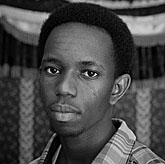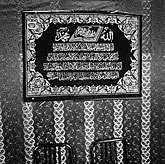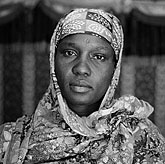I came here with my two sisters and one of my older brothers—we were four people. My brother doesn't live with us. He's old enough and he lives alone. My sisters and I lived together, but one of my sisters got married last year. She lives in Maine right now. She has two kids already. I live here with my older sister, Maryan. She is around twenty-six, and she has seven kids. She was the oldest one, you know. She was like my mom—she was the one who raised me. She means a lot to me. My parents, I never see them. I was five years old the last time I saw them. I don't even remember them that much.
I don't remember much from living in Somalia. I was little then. All I know is there was a war, and a lot people were getting killed, and a lot of people were raping women. We walked from Somalia to Kenya. It took just forever to get there. We didn't have any food to eat. All we had was only the trees where we were getting apples. We were drinking the dirty water because we didn't have anything else to drink. When the war started, everybody just started running away immediately. We didn't even have enough time to wait for my parents and to find out where they were. My family—they thought we were dead—the four of us. They thought we were dead and we were thinking they were dead, too.
When we got to the first refugee camp, we didn't have any houses. They gave us tents—they gave out one to each family. So that was our home until we started building a house. We built our own. What we did was go in the forest and cut a lot of trees. Our house was not that big—we couldn't afford to have a big house because we had to build it. We put a lot of trees together to make a circle, and at the end we put some wood and some grasses to make a little cover. We had a lot of long grass over there, so we put it on top to make a roof. That's all we had to use and that's how most of the houses were made. It wasn't really that good of a house to live in, but it was better than the tent.
We were actually getting some help from the UN High Commission of Refugees. We would get some food from them. It was once a month, so if you ate it all before that, you wouldn't have any other food to eat. The food was actually not enough for the month. We were staying hungry for like two days. Then we would try and work and get a little more food. Everybody knew they were going to die because of hunger, so no one was even eating that much. We were eating just once a day—just a little bit for the whole day, and then the next day just a little bit more. We knew if we ran out there was going to be no way to find food, so we forced ourselves to eat a really small amount all month—to not run out of food.
That was a really big change—when we got here, we had food all the time. All you have to do is go to the grocery store and get whatever you want. That's a really good thing about food: when you get enough, everybody gets full.





